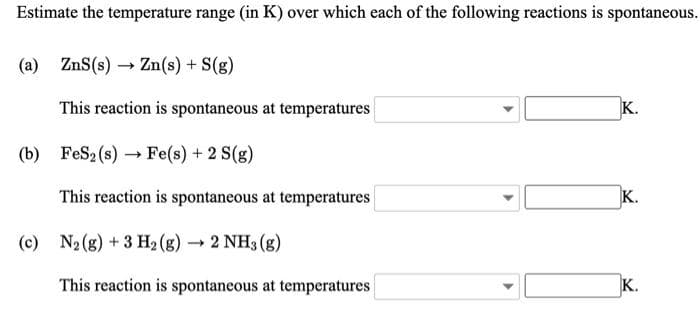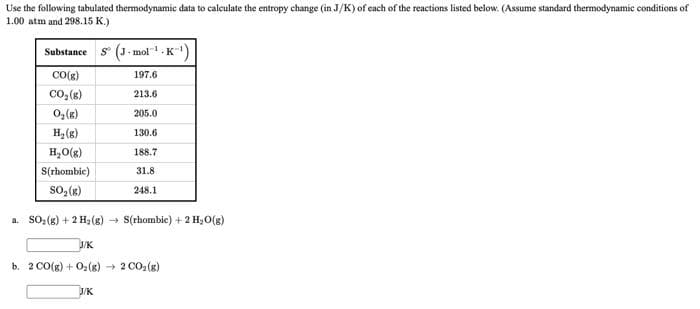Use the following tabulated thermodynamic data to calculate the entropy change (in J/K) of each of the reactions listed below. (Assume standard thermodynamic conditions of 1.00 atm and 298.15 K.) Substance s (J- mol - K) CO() 197.6 co,(g) 213.6 205.0 H, (8) 130.6 H,O(K) 188.7 S(rhombic) 31.8 so, (K) 248.1 a. So (8) + 2 H,(8) - S(thombie) + 2 H,0(s) /K b. 2 CO(g) + Os(g) 2 CO,(g) J/K
Use the following tabulated thermodynamic data to calculate the entropy change (in J/K) of each of the reactions listed below. (Assume standard thermodynamic conditions of 1.00 atm and 298.15 K.) Substance s (J- mol - K) CO() 197.6 co,(g) 213.6 205.0 H, (8) 130.6 H,O(K) 188.7 S(rhombic) 31.8 so, (K) 248.1 a. So (8) + 2 H,(8) - S(thombie) + 2 H,0(s) /K b. 2 CO(g) + Os(g) 2 CO,(g) J/K
Chemistry: The Molecular Science
5th Edition
ISBN:9781285199047
Author:John W. Moore, Conrad L. Stanitski
Publisher:John W. Moore, Conrad L. Stanitski
Chapter16: Thermodynamics: Directionality Of Chemical Reactions
Section: Chapter Questions
Problem 92QRT: The standard molar entropy of methanol vapor, CH3OH(g), is 239.8 J K1 mol-1. (a) Calculate the...
Related questions
Question

Transcribed Image Text:Estimate the temperature range (in K) over which each of the following reactions is spontaneous.
(a) ZnS(s) → Zn(s) + S(g)
This reaction is spontaneous at temperatures
K.
(b) FeS2 (s) → Fe(s) + 2 S(g)
This reaction is spontaneous at temperatures
K.
(c) N2(g) + 3 H2 (g) →
2 NH3 (g)
This reaction is spontaneous at temperatures
K.

Transcribed Image Text:Use the following tabulated thermodynamic data to calculate the entropy change (in J/K) of each of the reactions listed below. (Assume standard thermodynamic conditions of
1.00 atm and 298.15 K.)
Substance s (J - mol 1.K)
CO(8)
197.6
co, (s)
0, (e)
213.6
205.0
H2(g)
130.6
H,O(g)
188.7
S(rhombic)
31.8
so, (K)
248.1
a. SO:(g) + 2 H2(g) →
S(rhombic) + 2 H,0(g)
J/K
b. 2 CO(g) + Oz(s) + 2 CO2(g)
J/K
Expert Solution
This question has been solved!
Explore an expertly crafted, step-by-step solution for a thorough understanding of key concepts.
This is a popular solution!
Trending now
This is a popular solution!
Step by step
Solved in 3 steps

Knowledge Booster
Learn more about
Need a deep-dive on the concept behind this application? Look no further. Learn more about this topic, chemistry and related others by exploring similar questions and additional content below.Recommended textbooks for you

Chemistry: The Molecular Science
Chemistry
ISBN:
9781285199047
Author:
John W. Moore, Conrad L. Stanitski
Publisher:
Cengage Learning

Chemistry for Engineering Students
Chemistry
ISBN:
9781337398909
Author:
Lawrence S. Brown, Tom Holme
Publisher:
Cengage Learning

Chemistry & Chemical Reactivity
Chemistry
ISBN:
9781133949640
Author:
John C. Kotz, Paul M. Treichel, John Townsend, David Treichel
Publisher:
Cengage Learning

Chemistry: The Molecular Science
Chemistry
ISBN:
9781285199047
Author:
John W. Moore, Conrad L. Stanitski
Publisher:
Cengage Learning

Chemistry for Engineering Students
Chemistry
ISBN:
9781337398909
Author:
Lawrence S. Brown, Tom Holme
Publisher:
Cengage Learning

Chemistry & Chemical Reactivity
Chemistry
ISBN:
9781133949640
Author:
John C. Kotz, Paul M. Treichel, John Townsend, David Treichel
Publisher:
Cengage Learning

Physical Chemistry
Chemistry
ISBN:
9781133958437
Author:
Ball, David W. (david Warren), BAER, Tomas
Publisher:
Wadsworth Cengage Learning,

Principles of Modern Chemistry
Chemistry
ISBN:
9781305079113
Author:
David W. Oxtoby, H. Pat Gillis, Laurie J. Butler
Publisher:
Cengage Learning

Chemistry: Principles and Practice
Chemistry
ISBN:
9780534420123
Author:
Daniel L. Reger, Scott R. Goode, David W. Ball, Edward Mercer
Publisher:
Cengage Learning